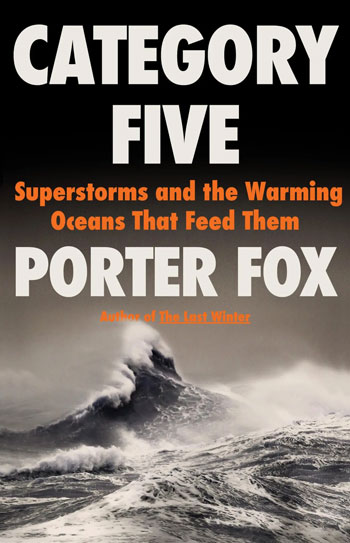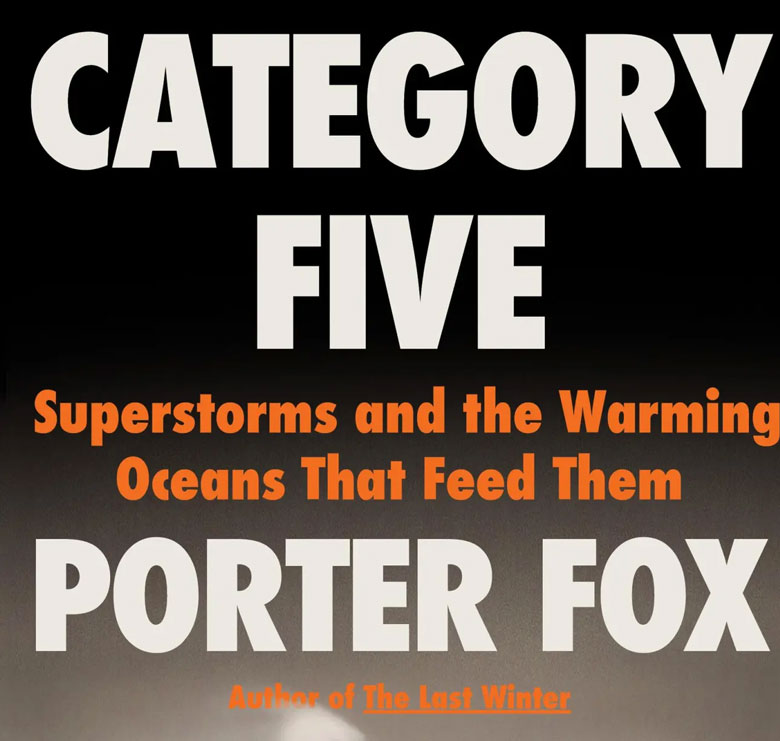Category Five: Superstorms and the Warming Oceans That Feed Them
By Porter Fox (Little, Brown 2024)
I found Porter Fox’s Category Five: Superstorms and the Warming Oceans That Feed Them a riveting read. So much so, I think I lost focus, experiencing the book more as a series of edge-of-the-seat stories packing thrills in its survival stories from deadly storms at sea.
It’s akin to an experience in which you momentarily throw reality out the window, only aware of the visceral experience of fear. You’re not focused on all the horror and damage and trauma for the humans involved, and certainly not how things got that way. The thrum of adrenaline pumping can be a thrill in itself. And so my first reaction to Fox’s book was “Whew! I survived!” Secondarily, I learned super storms really are becoming the new normal.
The New York Times published an op-ed column by Fox on Oct. 11, the day Milton hit the Gulf Coast of Florida. If Fox’s book had been written now, after the two back-to-back storms of Helene and Milton, there would have been two more examples to add to his warning that supercharged hurricanes are no longer outliers, freak disasters, or so-called “storms of the century.”
Fox is quite explicit, explaining: “Fossil fuel pollution has made them more than a fixture of life around the world, and they are going to get worse, with millions of people in their crosshairs.”
Fox is a lifelong sailor, and spent his earliest years in Southwest Harbor where his father designed and built sailboats at Able Marine. He describes himself as someone who is lucky to be alive, given the storms at sea he’s survived, and that it isn’t his expertise that saved him.
“Freak tornadoes, blizzards, and massive midlatitude cyclones will have become the norm, bringing near-constant natural disaster…”
He pays homage to sailors better trained and more skilled than he, and he has tried to learn from them—in classes, cruising, or from their books.
Fox offers vivid descriptions of the damage storms will do. He imagines that the “most powerful storm ever seen on Earth will form from a cluster of convective supercells sometime around 2100.” It will follow years filled with droughts, wildfires, floods, famines, and sea level rise. Average U.S temperatures will have by then climbed an additional eight degrees Fahrenheit.

“Freak tornadoes, blizzards, and massive midlatitude cyclones will have become the norm, bringing near-constant natural disaster to North America,” he writes.
Personally, while I’d rather be white-knuckled reading a book of sailing stories, I think this is his point—We need to boldly face our likely future and think about how to improve things before it gets that bad.
Fox thinks a better understanding of the role of our planet’s oceans and what carbon emissions are doing is a good start.
As waters warm, they will feed stronger storms and therefore do greater damage. Fox thinks Americans are particularly in denial about “the concept of changing weather” and that “it appears baked into our common psyche.”
My initial reaction to Category Five focused on the thrilling sailing sequences. But Hurricane Milton intervened, leading to some self-reflection. Since Fox includes climate science and ocean data in the book, why was I paying less attention to that?
I was uncomfortable; in denial, happy to be distracted from worrying about warming oceans.
As far as feeling safe, I expect I can and would choose to avoid being on a sailboat during a hurricane. But is there any way I can avoid the trajectory of climate change, with carbon emissions soaring?
There will be future generations—my grandchildren for example—who most likely will be unable to enjoy life on Vinalhaven the way I have because of increased erosion and flooding. Two storm surges last winter flooded downtown and damaged lobstering infrastructure of docks and floats.
A plan to avoid destruction of our downtown—where many islanders live, work, and shop—has mixed support from islanders.
While it may not be me or you in a storm-tossed sailboat, we will likely and unavoidably be impacted by climate change. We’ll have stronger storms because more energy is drawn into weather systems as they pass over warmer ocean waters. Fox sounds an important warning in a text managing to be both entertaining and educational.
Tina Cohen lives part of the year on Vinalhaven.





